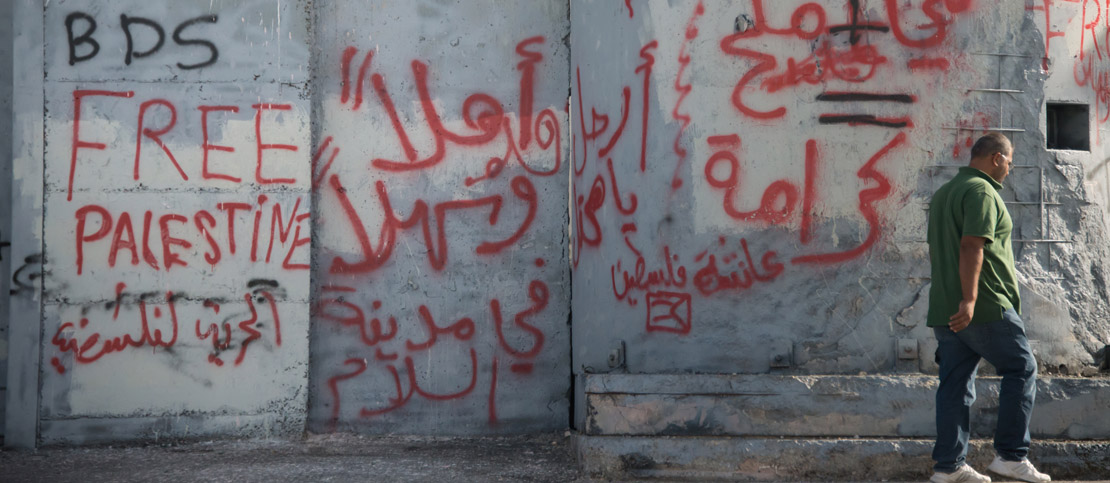(This article was first published in Arabic on Bokra)
Omar Barghouti is one of the most infamous names in pro-Israel and Israeli government circles at the moment. Officials have portrayed this Palestinian human rights activist and leader of the BDS movement — which he co-founded a decade ago and now leads — as a threat to the State of Israel. How big of a threat? Well, just last week the country’s best-selling newspaper, Yedioth Ahronot, featured a front-page story about him, dubbing him “Explosive Omar.” And if he and his boycott movement are giving both Zionist officials and their media a panic attack, one can only assume he is doing something right.
“Is this the Renaissance era for BDS?” I ask him in a phone call. He laughs and tells me that there is still much to come.
Yet Barghouti, 51, refuses to respond to his accusers — he maintains a boycott of the Israeli media. He was willing to conduct this rare interview due to my Palestinian identity and under the condition that it be published first in Arabic, on Palestinian website “Bokra” – although it is also being published in English here on +972 Magazine and in Hebrew on Local Call, where I am a blogger. Unified trilingual anti-Zionism at its best, I must add.
Barghouti explains his choice to not speak with the Israeli media and the logic behind the more general call for boycott, divestment and sanctions against Israel as a whole: “In every other situation of sustained oppression, human rights groups call for punitive measures against the state and its institutions, not just against a narrow component of the state that is directly connected to the injustice at hand. No one called for banning products of Sudanese companies producing in Darfur in response to the Sudanese regime’s war crimes there. Sudan as a whole was targeted.
“As Archbishop Desmond Tutu once said, Israel is put on a pedestal in the West, and treated as if it were above international law. BDS seeks to end this Israeli exceptionalism and criminal impunity. Israel must be treated like any other state committing similarly egregious crimes.”
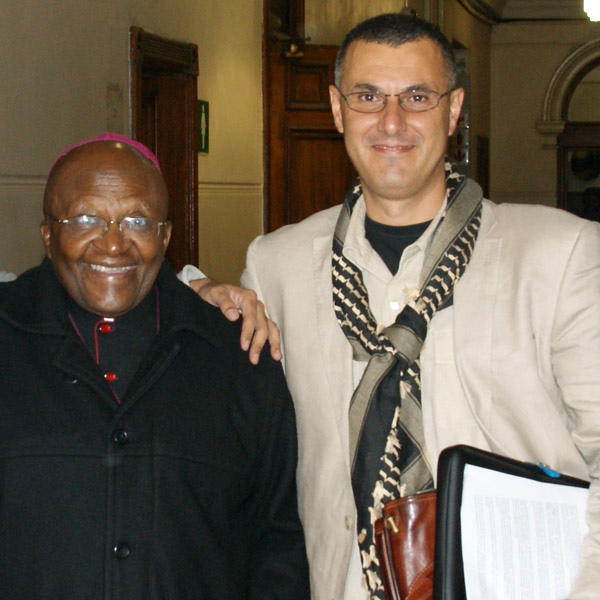
The BDS movement was launched on July 9, 2005 when a broad alliance of more than 170 Palestinian political parties, trade unions, refugee networks, NGOs and grassroots associations published an open boycott call to international civil society organizations and people of conscience. It called to “impose broad boycotts and implement divestment initiatives against Israel similar to those applied to South Africa in the apartheid era,” Barghouti says. “Today, the global BDS movement is led by the largest coalition in Palestinian society, the BDS National Committee (BNC).”
BDS calls for: an end to Israel’s occupation of Palestinian and other Arab territories since 1967, including dismantling the wall and colonies; an end to Israel’s system of racial discrimination against its Palestinian citizens; and respecting the UN-sanctioned, fundamental right of Palestinian refugees to return to their homes.
“These three basic rights correspond to the three main components of the Palestinian people: those in the Gaza Strip and the West Bank, including East Jerusalem; those in the 1948 territory who live under Israeli apartheid, and those in exile”, Barghouti says. He insists that regardless of what shape the political solution to the conflict takes – it must be based on these principles.
The tool that 170 Palestinian civil society organizations chose in their struggle to demand these rights, and to fight the Israeli occupation, is based wholly on a human rights discourse and non-violent action — as opposed to the violence of the occupation itself. For this reason at least, it is important to hear and understand what Barghouti has to say.
You have had a lot of successes in your campaign recently, two examples being Lauryn Hill canceling her show in Israel and Orange threatening to pull its brand from the country. What other success stories can you talk about that did not get as much media attention?
“The huge Dutch pension fund, PGGM, whose international investments are close to $200 billion, decided last year to divest from the top five Israeli banks due to their involvement in financing the occupation.
“This was followed by the U.S. Presbyterian Church’s divestment from Caterpillar, HP and Motorola Solutions for their complicity in the occupation, and by Bill Gates’ divestment from G4S, the largest security company in the world, which is involved in Israelis crimes against the Palestinian people. BDS is succeeding in revealing the toxicity of the ‘brand’ Israel.”
The artificial distinction between Israel and ‘the occupation’ is political and ideological.Omar Barghouti
Some BDS activists choose to boycott all of Israel, not just companies or bodies profiting directly from the occupation. Why is that?
“The artificial and untenable distinction between Israel and ‘the occupation’ is political and ideological; it is not based on practical, legal or moral considerations. It is Israel that international law regards as the occupying power, and therefore, is the party responsible for the construction and maintenance of not just the colonial settlements, but also the whole occupation regime.
“Israel is also responsible for what even the U.S. Department of State has criticized as institutional, legal, and societal discrimination against Palestinian citizens of Israel, and such a system fits the UN definition of apartheid.”
But Israel’s deepest injustice, Barghouti argues, is the denial of the right of return to Palestinian refugees. Those refugees, uprooted and dispossessed in 1948, comprise 68 percent of the Palestinian people. They, too, deserve equal human rights, he insists.
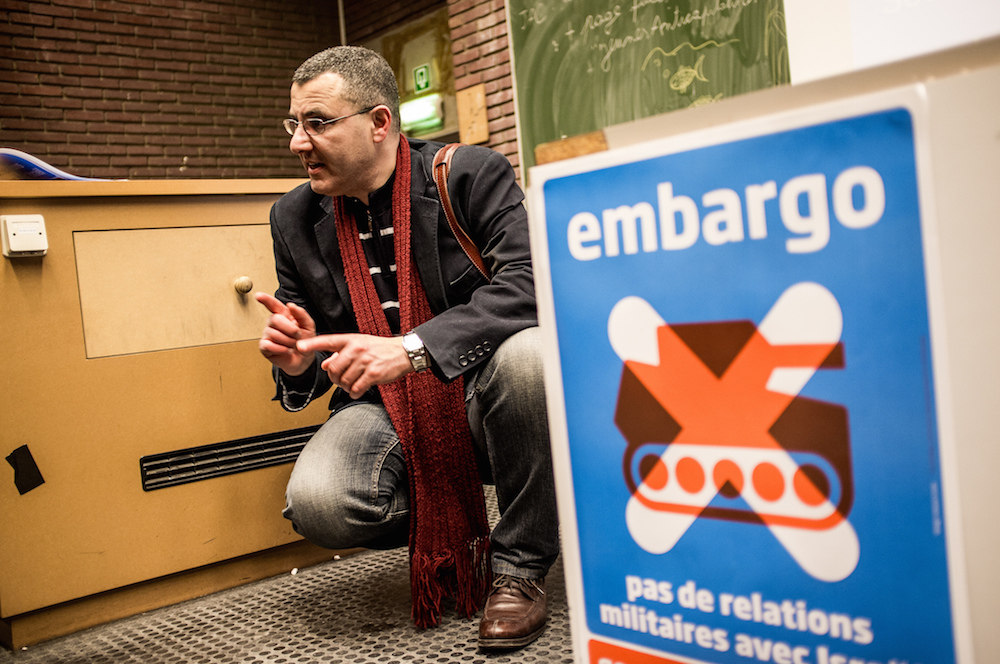
A common accusation against the international BDS campaign is that it feeds on anti-Semitism. What do you say to that?
“BDS is a non-violent human rights movement that seeks freedom, justice and equality for the Palestinian people, based on international law and universal principles of human rights. As such, BDS has consistently and categorically rejected all forms of discrimination and racism, including anti-Semitism as well as dozens of racist laws in Israel.
“Our non-violent struggle has never been against Jews or Israelis as Jews, but against an unjust regime that enslaves our people with occupation, apartheid and denial of the refugees’ UN-stipulated rights. We are proud of the disproportionately high number of Jewish activists in the BDS movement, especially in the U.S.
“Conflating time-honored, human-rights-based boycotts of Israel’s violations of international law with anti-Jewish racism is not only false, it is a racist attempt to put all Jews into one basket and to implicate them in Israel’s crimes against the Palestinians.
“Israel’s charge of racism against the BDS movement is akin to the Ku Klux Klan accusing Martin Luther King Jr. and Rosa Parks of racism! It is so blatantly propagandistic.”
How do you identify an individual, organization or any other entity to target? And once you’ve identified them, how do you proceed from there?
“The three general criteria that the Palestinian BNC recommends in selecting strategic targets are: first, the level of complicity – focusing on companies and products that are most clearly and directly involved in Israel’s human rights violations and easiest to explain to a wide audience.
“Second, cross-movement alliance possibility: prioritizing companies or products that enable the creation of broad, cross-struggle alliances. For example, the campaign to stop contracts with the Israeli water company, Mekorot, engages a wide spectrum of environmental and anti-privatization campaigns.
“And third, the potential for success: a BDS campaign should have a realistic chance of success, beyond simply raising awareness, such as persuading an international company or institution to end support for an Israeli company.”
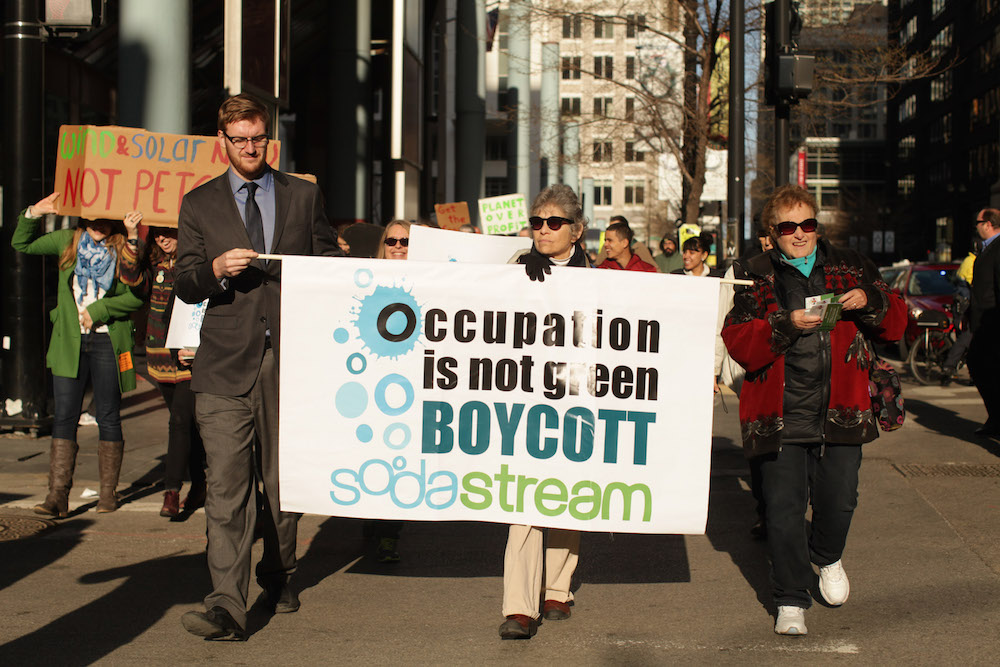
A couple of months back I hosted a public discussion with Barghouti in front of 400 Palestinian citizens of Israel in the city of Ara’ra. Before we began, I asked members of the audience to raise their hands if they had ever heard of the BDS movement. Only 20 people did. I looked at Barghouti; he was smiling. He knew what I was about to ask. I remind him of that moment now. (A note going forward, the terms ’48 region and ’48 Palestinians refer to the area inside Israel’s pre-1967 borders and Palestinian citizens of Israel, respectively.)
“The Oslo accords disenfranchised Palestinians in the 1948 region, causing a serious rift,” he explains. “On the contrary, the BDS movement insists on the right of all Palestinians to exercise self-determination as a unified people and as such, insists on the rights of all Palestinians, including ‘48 Palestinians. Major groups within ‘48 were part of the launch of BDS in 2005, but the movement has not done enough to raise awareness there.
“Also, the struggle to decolonize our minds is an uphill struggle in the ‘48 region, as the process of ‘Israelization,’ or colonization of our minds, has been entrenched over the last seven decades. An essential part of what the BDS movement does on daily basis is shattering despair and nourishing hope and conviction that we, the oppressed, are capable of ending oppression.”
Our non-violent struggle has never been against Jews or Israelis as Jews, but against an unjust regime.Omar Barghouti
More and more companies are likely to pull out of Israel in the coming years as a result of BDS efforts, and that would be a success for the movement. However, what do you say to Palestinian citizens in Israel who might face layoffs or other economic consequences as a result of multi-national companies leaving the Israeli market?
“Israel’s regime of oppression, not the resistance to occupation and apartheid, is responsible for this and every other consequence of this resistance to oppression.
“Those who claim that BDS hurts Palestinians are not just making unfounded and unethical claims that fail to understand how resistance is always costly at first. They are also patronizing in telling Palestinians that they understand our interests better than we do. We reject this colonial attitude completely. Nothing hurts the Palestinian people, whether in ‘67′, ‘48 or in exile, as much as Israel’s racist and colonial oppression does.”
As a Palestinian citizen of Israel who can’t support BDS publicly due to restricting laws, I feel I can’t really join your non-violent popular movement. How can local activists still support you?
“This is a misunderstanding of the draconian and anti-democratic Israeli anti-BDS law. As bad as it is, the law does not actually prevent support for BDS. It only makes it illegal to publicly advocate for boycotting Israel or any Israeli institution. Any Jewish or Palestinian citizen of Israel who wishes to support the BDS movement can publicly declare his or her support without violating the law — so long as they do not directly call for any boycott.
(Editor’s note: Israel’s anti-boycott law does not criminalize calling for boycotts of Israel or its institutions, but it does allow private citizens to sue anybody who makes such a public boycott call for monetary damages.)
“There are ways to circumvent this repressive law. For instance, I can present why Company X is complicit in violations of international law and then say, ‘I myself am boycotting this company’s products, but because of the repressive anti-boycott law. I am not allowed to call on you to boycott it too.’ That way I am indirectly calling for the boycott without breaching the law.
“But ultimately, we need wide-spread civil disobedience against this and all other draconian Israeli laws, as was done in the U.S. civil rights movement and the South African anti-apartheid movement. Unethical and unjust laws should never be obeyed. People of conscience should collectively and actively disobey them and eventually repeal them.”
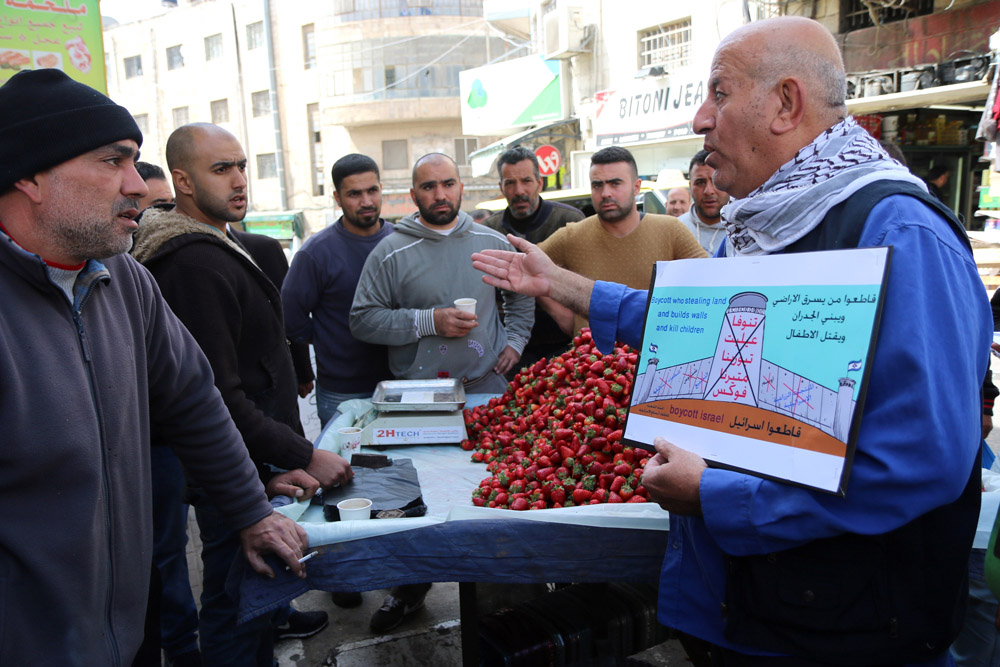
Another recent success for the BDS campaign, which made headlines in Israel and worldwide, was — surprisingly — not organized by Barghouti and the BNC, but by the Palestinian Authority. As a member of FIFA, the Palestinian Football Association was able to threaten Israel with expulsion from international sporting tournaments, and eventually forced it to alter its policies that effect Palestinian soccer. I want to understand how Barghouti feels about this — and the PA itself.
“BDS is a grassroots and civil society human rights movement that is entirely independent of the official Palestinian structures and any government,” he emphasizes. “It played a critical role in the campaign to expel Israel from FIFA, and most observers recognize that role. Palestine solidarity activists, almost all of whom are BDS supporters, have been struggling for months to raise awareness about Israel’s violations of Palestinian athletes’ rights in the context of its overall occupation and oppression.
“The fact that Palestinian officials led the public effort in this regard was our Achilles’ heel because the Palestinian Authority is chained with the humiliating Oslo agreement and is not designed to resist Israel’s regime of oppression in any meaningful and strategic way.”
We are not there yet, but we are reaching our South Africa moment.Omar Barghouti
The BDS movement is getting more and more popular. Where do you see the movement going in both the near and far future?
“We are going mainstream. That is our challenge. We are not begging for charity; we are appealing for effective solidarity. As Martin Luther King Jr. once said, boycott on a basic level entails ‘withdrawing cooperation from an evil system.’ When we ask institutions and organizations to divest from companies involved in Israel’s crimes we are not asking for anything heroic. We are merely asking those organizations to fulfill a profound moral obligation. This is the compelling, ethical logic of BDS, and this is a main factor behind the movement’s impressive growth over the last decade.
“The BDS movement is reaching a tipping point mainly because its strategy works — it works well — and because Israel has shifted to the fanatic right with fascist elements in government, dropping the last mask of its deceptive ‘democracy.’ Perhaps our most important achievement is uniting Palestinians from across the political and ideological spectrums on a human rights platform and behind a non-violent form of resistance that is anchored in international law.”
Judging from the victories BDS appears to be racking up recently it seems that finally, this strategy based on a rationale of sustained and escalating pressure on Israel in all fields – academic, cultural, economic and military – is starting to have a real and serious effect. Or as Omar Barghouti puts it, “we are not there yet, but we are reaching our South Africa moment.”
A version of this article was also published in Hebrew on Local Call, where the author is a blogger. Read it here. Read it in Arabic here on Bokra.net. (Top photo: Graffitti on the separation wall in Bethlehem, by Ryan Rodrick Beiler/Activestills.org)

